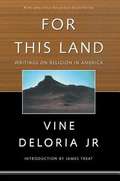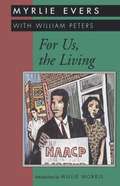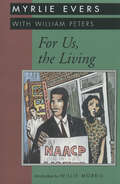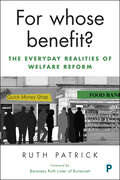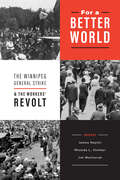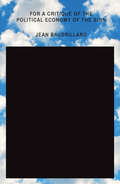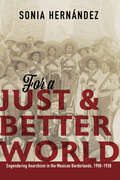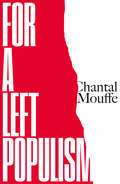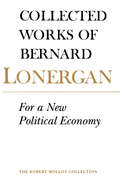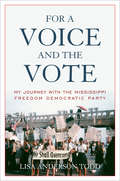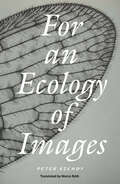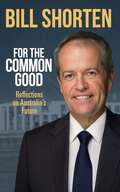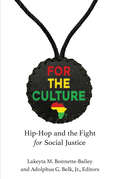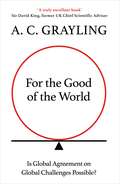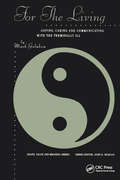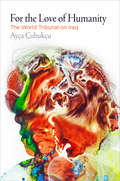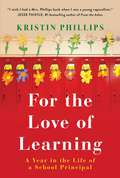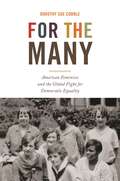- Table View
- List View
For Such a Time as This: My Faith Journey through the White House and Beyond
by Kayleigh McEnanyKayleigh McEnany describes her path to the White House podium, bringing the reader behind the scenes in the world’s most powerful building and illuminating how faith got her through. <P><P>If you would have told me that in the year 2020 I would stand at the White House podium and communicate with the American people as COVID-19 ravaged the globe and violent protests beset the nation, I would have told you that you were crazy. But Jesus Christ had this very plan for my life. <P><P>From White House intern to White House press secretary, from production assistant to national television host, from Catholic all-girls high school to Harvard Law School, God has guided my path through uncharted territory. <P><P>In For Such a Time as This, I will chronicle my journey to the White House and offer never-before-told anecdotes about what really happened within the Trump administration. You will experience some of the most high stakes moments in the West Wing right alongside me as I reveal how faith got me through. <P><P><b>A New York Times Best Seller</b>
For The Soul Of Mankind: The United States, The Soviet Union, And The Cold War
by Melvyn P. LefflerTo the amazement of the public, pundits, and even the policymakers themselves, the ideological and political conflict that had endangered the world for half a century came to an end in 1990. How did that happen? What caused the cold war in the first place, and why did it last as long as it did? The distinguished historian Melvyn P. Leffler homes in on four crucial episodes when American and Soviet leaders considered modulating, avoiding, or ending hostilities and asks why they failed: Stalin and Truman devising new policies after 1945; Malenkov and Eisenhower exploring the chance for peace after Stalin's death in 1953; Kennedy, Khrushchev, and LBJ trying to reduce tensions after the Cuban Missile Crisis of 1962; and Brezhnev and Carter aiming to sustain détente after the Helsinki Conference of 1975. All these leaders glimpsed possibilities for peace, yet they allowed ideologies, political pressures, the expectations of allies and clients, the dynamics of the international system, and their own fearful memories to trap them in a cycle of hostility that seemed to have no end. For the Soul of Mankind illuminates how Reagan, Bush, and, above all, Gorbachev finally extricated themselves from the policies and mind-sets that had imprisoned their predecessors, and were able to reconfigure Soviet-American relations after decades of confrontation.
For This Land: Writings on Religion in America
by Vine Deloria Jr.The essays in this collection express Deloria's concern for the religious dimensions and implications of human existence. For This Land offers a distinctive approach to comprehending human existence from one of the leading critics of mainstream American thought.
For Us, The Living
by William Peters Myrlie B. EversIn 1967, when this brave book was first published, Myrlie Evers said, "Somewhere in Mississippi lives the man who murdered my husband. " Medgar Evers died in a horrifying act of political violence. Among both blacks and whites the killing of this Mississippi civil rights leader intensified the menacing moods of unrest and discontent generated during the civil rights era. His death seemed to usher in a succession of political shootings--Evers, then John Kennedy, then Martin Luther King, Jr. , then Robert Kennedy. At thirty-seven while field secretary for the NAACP, Evers was gunned down in Jackson, Mississippi, during the summer of 1963. Byron De La Beckwith, an arch segregationist charged with the crime, was released after two trials with hung juries. In 1994, after new evidence surfaced thirty years later, Beckwith was arrested and tried a third time. Medgar Evers's widow saw him convicted and jailed with a life sentence. In For Us, the Living this extraordinary woman tells a moving story of her courtship and of her marriage to this heroic man who learned to live with the probability of violent death. She describes her husband's unrelenting devotion to the quest of achieving civil rights for thousands of black Mississippians and of his ultimate sacrifice on that hot summer night. With this reprinting of her poignant yet painful memoir, a book long out of print comes back to life and underscores the sacrifice of Medgar Evers and his family. Introduced in a reflective essay written by the acclaimed Mississippi author Willie Morris, this account of Evers's professional and family life will cause readers to ponder how his tragic martyrdom quickened the pace of justice for black people while withholding justice from him for thirty years. Since the conviction of Beckwith in a dramatic and historical trial in a Mississippi court there has been renewed acclaim for Evers. One speculates that, had he lived, he might have attained even more for the equality of African Americans in national life.
For Us, the Living (Banner Books)
by Myrlie Evers WilliamsIn 1967, when this brave book was first published, Myrlie Evers said, “Somewhere in Mississippi lives the man who murdered my husband.” Medgar Evers died in a horrifying act of political violence. Among both blacks and whites, the killing of this Mississippi civil rights leader intensified the menacing moods of unrest and discontent generated during the civil rights era. His death seemed to usher in a succession of political shootings—Evers, then John Kennedy, then Martin Luther King, Jr., then Robert Kennedy. At thirty-seven while field secretary for the NAACP, Evers was gunned down in Jackson, Mississippi, during the summer of 1963. Byron De La Beckwith, an arch segregationist charged with the crime, was released after two trials with hung juries. In 1994, after new evidence surfaced thirty years later, Beckwith was arrested and tried a third time. Medgar Evers's widow saw him convicted and jailed with a life sentence. In For Us, the Living this extraordinary woman tells a moving story of her courtship and of her marriage to this heroic man who learned to live with the probability of violent death. She describes her husband's unrelenting devotion to the quest of achieving civil rights for thousands of black Mississippians and of his ultimate sacrifice on that hot summer night. With this reprinting of her poignant yet painful memoir, a book long out of print comes back to life and underscores the sacrifice of Medgar Evers and his family. Introduced in a reflective essay written by the acclaimed Mississippi author Willie Morris, this account of Evers's professional and family life will cause readers to ponder how his tragic martyrdom quickened the pace of justice for black people while withholding justice from him for thirty years. Since the conviction of Beckwith in a dramatic and historical trial in a Mississippi court there has been renewed acclaim for Evers. One speculates that, had he lived, he might have attained even more for the equality of African Americans in national life.
For Whom the Dogs Spy: Haiti: From the Duvalier Dictatorships to the Earthquake, Four Presidents, and Beyond
by Raymond A. JosephWhen the 2010 earthquake struck Haiti, Raymond Joseph, the former Haitian ambassador to the United States, found himself rushing back to his beloved country. The earthquake ignited a passion in Joseph, inspiring him to run for president against great competition, including two well-known Haitian pop stars, his nephew Wyclef Jean and Michel Martelly. But he couldn't compete in a democratic system corrupt to the core.Joseph's insider's account-having served four presidents-explores the country's unfolding democracy. He unearths the hidden stories of Haiti's cruel dictators, focusing on the tyranny of François "Papa Doc" Duvalier, who used the legend of voodoo to bewitch the country into fearing him.Joseph's terrifying experiences while infiltrating the father-son regime are chilling. Threatened by Duvalier's budding gestapo-like police, Joseph sought sanctuary in America. His grueling experience in Haitian politics gave him a unique outlook on international affairs, and he excelled in his ambassadorial career in the United States.Deep personal knowledge of politics allows Joseph to speak candidly about Haitian history. Readers will be surprised at how important the country of Haiti has been in global (and especially American) history. In this decades-spanning work, he challenges common misconceptions about Haiti. The country is rarely referenced without a mention of it being the "poorest in the Western Hemisphere," a reductive label unfit for summarizing its rich history. There is no discussion around Haitian history beyond the war of independence. In For Whom the Dogs Spy, Raymond Joseph provides a compelling, modern-day look at Haiti like no other.With this book, Ambassador Raymond Joseph warns readers about Haiti's current political leaders' attempts to impose a new dictatorship. His hope is that Haiti can right itself despite the destruction it has suffered at the hands of man and nature.
For Whose Benefit?: The Everyday Realities of Welfare Reform
by Ruth PatrickWhat does day-to-day life involve for those who receive out-of-work benefits? Is the political focus on moving people from ‘welfare’ and into work the right one? And do mainstream political and media accounts of the ‘problem’ of ‘welfare’ accurately reflect lived realities? For whose benefit? The everyday realities of welfare reform explores these questions by talking to those directly affected by recent reforms. Ruth Patrick interviewed single parents, disabled people and young jobseekers on benefits repeatedly over five years to find out how they experienced the rights and responsibilities of citizenship, and whether the welfare state still offers meaningful protection and security in times of need. She reflects on the mismatch between the portrayal of ‘welfare’ and everyday experiences, and the consequences of this for the UK’s ongoing welfare reform programme. Exploring issues including the meaning of dependency, the impact of benefit sanctions and the reach of benefits stigma, this important book makes a timely contribution to ongoing debates about the efficacy and ethics of welfare reform.
For a Better World: The Winnipeg General Strike and the Workers' Revolt
by James Naylor;Rhonda L. Hinther;Jim Mochoruk;editorsCanada’s largest and most famous example of class conflict, the Winnipeg General Strike, redefined local, national, and international conversations around class, politics, region, ethnicity, and gender. The Strike’s centenary occasioned a re-examination of this critical moment in working-class history, when 300 social justice activists, organizers, scholars, trade unionists, artists, and labour rights advocates gathered in Winnipeg in 2019. Probing the meaning of the General Strike in new and innovative ways, For a Better World includes a selection of contributions from the conference as well as others’ explorations of the character of class confrontation in the aftermath of the First World War. Editors Naylor, Hinther, and Mochoruk depict key events of 1919, detailing the dynamic and complex historiography of the Strike and the larger Workers’ Revolt that reverberated around the world and shaped the century following the war. The chapters delve into intersections of race, class, and gender. Settler colonialism’s impact on the conflict is also examined. Placing the struggle in Winnipeg within a broader national and international context, several contributors explore parallel strikes in Edmonton, Crowsnest Pass, Montreal, Kansas City, and Seattle. For a Better World interrogates types of commemoration and remembrance, current legacies of the Strike, and its ongoing influence. Together, the essays in this collection demonstrate that the Winnipeg General Strike continues to mobilize—revealing our radical past and helping us to think imaginatively about collective action in the future.
For a Critique of the Political Economy of the Sign
by Jean BaudrillardA material analysis of the sign which deepens Marx's critique of political economy for spectacular times.What if the problems of modern society don't come from production, but rather consumption and the system of cultural signs? In this classic work from the defining intellectual of the postmodern, Jean Baudrillard, For a Critique of the Political Economy of the Sign takes Marx's critique of political economy and its analysis of the commodity form as the starting point for an analysis of signs and their meaning in modern society. Influenced by Lefebvre's critique of everyday life, Barthes's semiology, and Situationism, Baudrillard analyses how objects are encoded within the system of signs and meanings that constitute contemporary media and consumer societies. Combining semiological studies and sociology of the consumer society, For a Critique of the Political Economy of the Sign contains Baudrillard's most extensive engagement with Marxism and shows him at a critical juncture for the development of his thought.
For a Just and Better World: Engendering Anarchism in the Mexican Borderlands, 1900-1938
by Sonia HernandezCaritina Piña Montalvo personified the vital role played by Mexican women in the anarcho-syndicalist movement. Sonia Hernández tells the story of how Piña and other Mexicanas in the Gulf of Mexico region fought for labor rights both locally and abroad in service to the anarchist ideal of a worldwide community of workers. An international labor broker, Piña never left her native Tamaulipas. Yet she excelled in connecting groups in the United States and Mexico. Her story explains the conditions that led to anarcho-syndicalism's rise as a tool to achieve labor and gender equity. It also reveals how women's ideas and expressions of feminist beliefs informed their experiences as leaders in and members of the labor movement. A vivid look at a radical activist and her times, For a Just and Better World illuminates the lives and work of Mexican women battling for labor rights and gender equality in the early twentieth century.
For a Left Populism
by Chantal MouffeWhat is the "populist moment" and what does it mean for the left?Populism, today, is the expression of a crisis of liberal-democratic politics. It is more than an ideology or a political regime. It is a way of doing politics that can take various forms but emerges when one aims at building a new subject of collective action--the people.In this new book the leading political thinker Chantal Mouffe proposes a new way to define left populism. The political is to be constructed by establishing a political frontier that divides society into two camps, mobilising an "underdog" against "those in power". Populism, far from being a perversion of democracy, constitutes the most adequate political force to recover and reconstitute itself. This new politics must recognise its partisan character. This presents itself as more than the image of demagoguery and emotive rabbles seen across our media. Furthermore, it is an urgent struggle, because the future will be formed by the kind of populism that emerges victorious from the conflict against the current threats of post-politics and post-democracy.
For a New Political Economy: Volume 21
by Bernard Lonergan Philip McshaneBernard Lonergan's economic writings span forty years and represent one of the most important intellectual achievements of the twentieth century. Unfortunately they have been inaccessible outside of the Lonergan research community as the majority of them have not been formally published, and exist only as a group of unfinished essays and material for courses on economics taught by Lonergan. The publication of For a New Political Economy, along with its companion volume, Macroeconomic Dynamics: An Essay in Circulation Analysis (Collected Works of Bernard Lonergan, Volume 15), seeks to remedy this by bringing together the various elements of Lonergan's economic thought. Lonergan's concept of economics differs radically from that of contemporary economists and represent a major paradigm shift. He takes a fresh look at fundamental variables and breaks from centralist theory and practice, offering a uniquely democratic perspective on surplus income and non-political control. For a New Political Economy is a collection of drafts, notes, and essays written by Lonergan in the 1940s on various aspects of economics. This volume provides the intellectual underpinnings of ideas more fully explored in Macroeconomic Dynamics.
For a Voice and the Vote: My Journey with the Mississippi Freedom Democratic Party (Civil Rights and the Struggle for Black Equality in the Twentieth Century)
by Lisa Anderson ToddIn this detailed memoir of political action, a civil rights volunteer recounts her experience with the MFDP during 1964’s Freedom Summer.During the summer of 1964, hundreds of American college students descended on Mississippi to help the state's African American citizens register to vote. Student organizers, volunteers, and community members canvassed black neighborhoods to organize the Mississippi Freedom Democratic Party, a group that sought to give a voice to black Mississippians despite the terror and intimidation they faced.In For a Voice and the Vote, author Lisa Anderson Todd gives a fascinating insider's account of her experience volunteering in Greenville, Mississippi, when she participated in organizing the MFDP. The party provided political education, ran candidates for office, and offered participation in local and statewide meetings for blacks who were denied the vote.For Todd, it was an exciting, dangerous, and life-changing experience. Offering the first full account of the group's five days in Atlantic City, the book draws on primary sources, oral histories, and the author's personal interviews of individuals who were supporters of the MFDP in 1964.
For an Ecology of Images
by Peter SzendyA new, ecological approach to images by a renowned philosopherWhen Susan Sontag first proposed the idea of an &“ecology of images,&” she meant it as an exhortation to be vigilant against the vast surplus of pictures threatening our ability to truly see. Today, beyond the deep anxieties over a diminishing attention economy, concern focuses on the environmental cost of storing and circulating the digital images that confront us with unprecedented speed.Against the disposable rapidity demanded by digital media, Peter Szendy emphasizes the labor and time required for images to develop and come into view. This inquisitive essay takes us from mimicry in the animal kingdom to the history of the shadow, Pliny&’s story about the birth of painting to Nabokov&’s butterflies, the first use of slo-mo in film to the first aerial photograph.
For the Common Good: Reflections on Australia's Future
by Bill ShortenIn For the Common Good, Bill Shorten reflects on the values and beliefs that led him to devote himself to the labour movement and stand for the nation's highest office. He looks back on the emphasis on education and social justice in his childhood in suburban Melbourne, and his many years spent empowering tens of thousands of Australians in workplaces across our continent.Shorten examines the rapid pace of change in our modern world and offers a way forward that enables all Australians to adapt, seize new opportunities and preserve the Australian way—a prosperous society unshakeably committed to fairness. He argues that the key to unlocking a new century of national progress is in building a renewed common good between workers, businesses, governments and the community, from our cities to the regions.In this thoughtful narrative, Bill Shorten provides a unique insight into how a Labor government will shape Australia's future for the better, for all Australians.
For the Culture: Hip-Hop and the Fight for Social Justice (Music and Social Justice)
by Lakeyta Bonnette-Bailey Adolphus BelkFor the Culture: Hip-Hop and the Fight for Social Justice documents and analyzes the ways in which Hip-Hop music, artists, scholars, and activists have discussed, promoted, and supported social justice challenges worldwide. Drawing from diverse approaches and methods, the contributors in this volume demonstrate that rap music can positively influence political behavior and fight to change social injustices, and then zoom in on artists whose work has accomplished these ends. The volume explores topics including education and pedagogy; the Black Lives Matter movement; the politics of crime, punishment, and mass incarceration; electoral politics; gender and sexuality; and the global struggle for social justice. Ultimately, the book argues that Hip-Hop is much more than a musical genre or cultural form: Hip-Hop is a resistance mechanism.
For the Culture: Hip-Hop and the Fight for Social Justice (Music and Social Justice)
by Lakeyta Bonnette-Bailey Adolphus BelkFor the Culture: Hip-Hop and the Fight for Social Justice documents and analyzes the ways in which Hip-Hop music, artists, scholars, and activists have discussed, promoted, and supported social justice challenges worldwide. Drawing from diverse approaches and methods, the contributors in this volume demonstrate that rap music can positively influence political behavior and fight to change social injustices, and then zoom in on artists whose work has accomplished these ends. The volume explores topics including education and pedagogy; the Black Lives Matter movement; the politics of crime, punishment, and mass incarceration; electoral politics; gender and sexuality; and the global struggle for social justice. Ultimately, the book argues that hip hop is much more than a musical genre or cultural form: hip hop is a resistance mechanism.
For the Good of the World: Is Global Agreement on Global Challenges Possible?
by A. C. Grayling&‘A must read&’ Gordon Brown &‘A truly excellent book&’ Sir David King The three biggest challenges facing the world today, in A. C. Grayling&’s view, are climate change, technology and justice. In his timely new book, he asks: can human beings agree on a set of values that will allow us to confront the numerous threats facing the planet, or will we simply continue with our disagreements and antipathies as we collectively approach our possible extinction? As every day brings new stories about extreme weather events, spyware, lethal autonomous weapons systems, and the health imbalance between the northern and southern hemispheres, Grayling&’s question – Is Global Agreement on Global Challenges Possible? – becomes ever more urgent. The solution he proposes is both pragmatic and inspiring.
For the Living: Coping, Caring and Communicating with the Terminally Ill (Death, Value and Meaning Series)
by Mark GolubowRarely heard about in our society are caregivers' thoughts and feelings about life, death, and dying and how they act on those feelings. "For the Living: Coping, Caring and Communicating with the Terminally Ill" provides an in-depth, qualitative look at the experiences of oncology healthcare professionals as they work with terminally ill patients. Through a series of recorded and edited interviews, the author explores the social and cultural dynamics that affect physicians, nurses, and social workers routinely encountering mortality and loss. What death and the prospect of dying mean to these individuals should not be taken lightly.
For the Love of Humanity: The World Tribunal on Iraq (Pennsylvania Studies in Human Rights)
by Ayça ÇubukçuOn February 15, 2003, millions of people around the world demonstrated against the war that the United States, the United Kingdom, and their allies were planning to wage in Iraq. Despite this being the largest protest in the history of humankind, the war on Iraq began the next month. <P><P>That year, the World Tribunal on Iraq (WTI) emerged from the global antiwar movement that had mobilized against the invasion and subsequent occupation. Like the earlier tribunal on Vietnam convened by Bertrand Russell and Jean-Paul Sartre, the WTI sought to document—and provide grounds for adjudicating—war crimes committed by the United States, the United Kingdom, and their allied forces during the Iraq war.For the Love of Humanity builds on two years of transnational fieldwork within the decentralized network of antiwar activists who constituted the WTI in some twenty cities around the world. <P><P>Ayça Çubukçu illuminates the tribunal up close, both as an ethnographer and a sympathetic participant. In the process, she situates debates among WTI activists—a group encompassing scholars, lawyers, students, translators, writers, teachers, and more—alongside key jurists, theorists, and critics of global democracy.WTI activists confronted many dilemmas as they conducted their political arguments and actions, often facing interpretations of human rights and international law that, unlike their own, were not grounded in anti-imperialism. <P><P>Çubukçu approaches this conflict by broadening her lens, incorporating insights into how Amnesty International, Human Rights Watch, and the Iraqi High Tribunal grappled with the realities of Iraq's occupation. Through critical analysis of the global debate surrounding one of the early twenty-first century's most significant world events, For the Love of Humanity addresses the challenges of forging global solidarity against imperialism and makes a case for reevaluating the relationships between law and violence, empire and human rights, and cosmopolitan authority and political autonomy.
For the Love of Learning: A Year in the Life of a School Principal
by Kristin PhillipsFor parents, teachers, and everyone who remembers being a student, an unforgettable glimpse into the inner workings of school, from a life-long educator.Children spend most of their waking hours in school, exploring boundaries, forming important relationships, and of course, learning. But as you step into the unique vantage of the principal&’s office, you experience first-hand the wide range of characters, efforts, and decisions that ensure all students thrive. Kristin Phillips takes us through a school year, from the excitement of fall, through the long days of winter, and into the renewed energy that comes with spring. Through her eyes, we experience the increasingly complex education system: students with unique learning needs, teachers bringing their practice into the 21st century, and the parent-partners who have entrusted their children to the school system. Myles, a precocious five-year-old, introduces himself by swearing a blue streak on the first day of school. He finds solace in a paper box rocket ship in Phillips&’s office. Rafi, a grade 8 boy oozing with attitude, makes a very uncool choice to lunch with the principal. And Harriet, a struggling teacher, is oblivious to the fact her students are bored to tears. Throughout the story, Phillips develops caring relationships with the people who need her the most, as she works with colleagues to create an environment where everyone succeeds. But principals are people, too, and Phillips also recounts the demands on her as a single mother with three teenagers, one of whom suffers from significant mental health issues. As an educator, she tries to help students coping with similar problems and reveals a heartfelt story of dealing with the system, from both sides. With honesty and compassion, Phillips gives a human face to the joys of school, and the very real difficulties educators work to overcome, one year and one student at a time.
For the Love of the Royal Family: A Companion
by Roger BryanThis rich miscellany celebrates the fascinating history of the British Royal Family, from the reign of Egbert, King of Wessex, to the monarchy of the present day, with titillating trivia, little-known facts, bite-size biographies and memorable quotations.
For the Love of the Royal Family: A Companion
by Roger BryanThis rich miscellany celebrates the fascinating history of the British Royal Family, from the reign of Egbert, King of Wessex, to the monarchy of the present day, with titillating trivia, little-known facts, bite-size biographies and memorable quotations.
For the Many: American Feminists and the Global Fight for Democratic Equality (America in the World #56)
by Dorothy Sue CobbleA history of the twentieth-century feminists who fought for the rights of women, workers, and the poor, both in the United States and abroadFor the Many presents an inspiring look at how US women and their global allies pushed the nation and the world toward justice and greater equality for all. Reclaiming social democracy as one of the central threads of American feminism, Dorothy Sue Cobble offers a bold rewriting of twentieth-century feminist history and documents how forces, peoples, and ideas worldwide shaped American politics. Cobble follows egalitarian women’s activism from the explosion of democracy movements before World War I to the establishment of the New Deal, through the upheavals in rights and social citizenship at midcentury, to the reassertion of conservatism and the revival of female-led movements today.Cobble brings to life the women who crossed borders of class, race, and nation to build grassroots campaigns, found international institutions, and enact policies dedicated to raising standards of life for everyone. Readers encounter famous figures, including Eleanor Roosevelt, Frances Perkins, and Mary McLeod Bethune, together with less well-known leaders, such as Rose Schneiderman, Maida Springer Kemp, and Esther Peterson. Multiple generations partnered to expand social and economic rights, and despite setbacks, the fight for the many persists, as twenty-first-century activists urgently demand a more caring, inclusive world.Putting women at the center of US political history, For the Many reveals the powerful currents of democratic equality that spurred American feminists to seek a better life for all.
For the Muslims: Islamophobia in France
by Edwy PlenelA piercing denunciation of Islamophobia in France, in the tradition of Emile ZolaAt the beginning of the twenty-first century, leading intellectuals are claiming "There is a problem with Islam in France," thus legitimising the discourse of the racist National Front. Such claims have been strengthened by the backlash since the terrorist attacks in Paris in January and November 2015, coming to represent a new 'common sense' in the political landscape, and we have seen a similar logic play out in the United States and Europe.Edwy Plenel, former editorial director of Le Monde, essayist and founder of the investigative journalism website Mediapart tackles these claims head-on, taking the side of his compatriots of Muslim origin, culture or belief, against those who make them into scapegoats. He demonstrates how a form of "Republican and secularist fundamentalism" has become a mask to hide a new form of virulent Islamophobia. At stake for Plenel is not just solidarity but fidelity to the memory and heritage of emancipatory struggles and he writes in defence of the Muslims, just as Zola wrote in defence of the Jews and Sartre wrote in defence of the blacks. For if we are to be for the oppressed then we must be for the Muslims.From the Trade Paperback edition.


